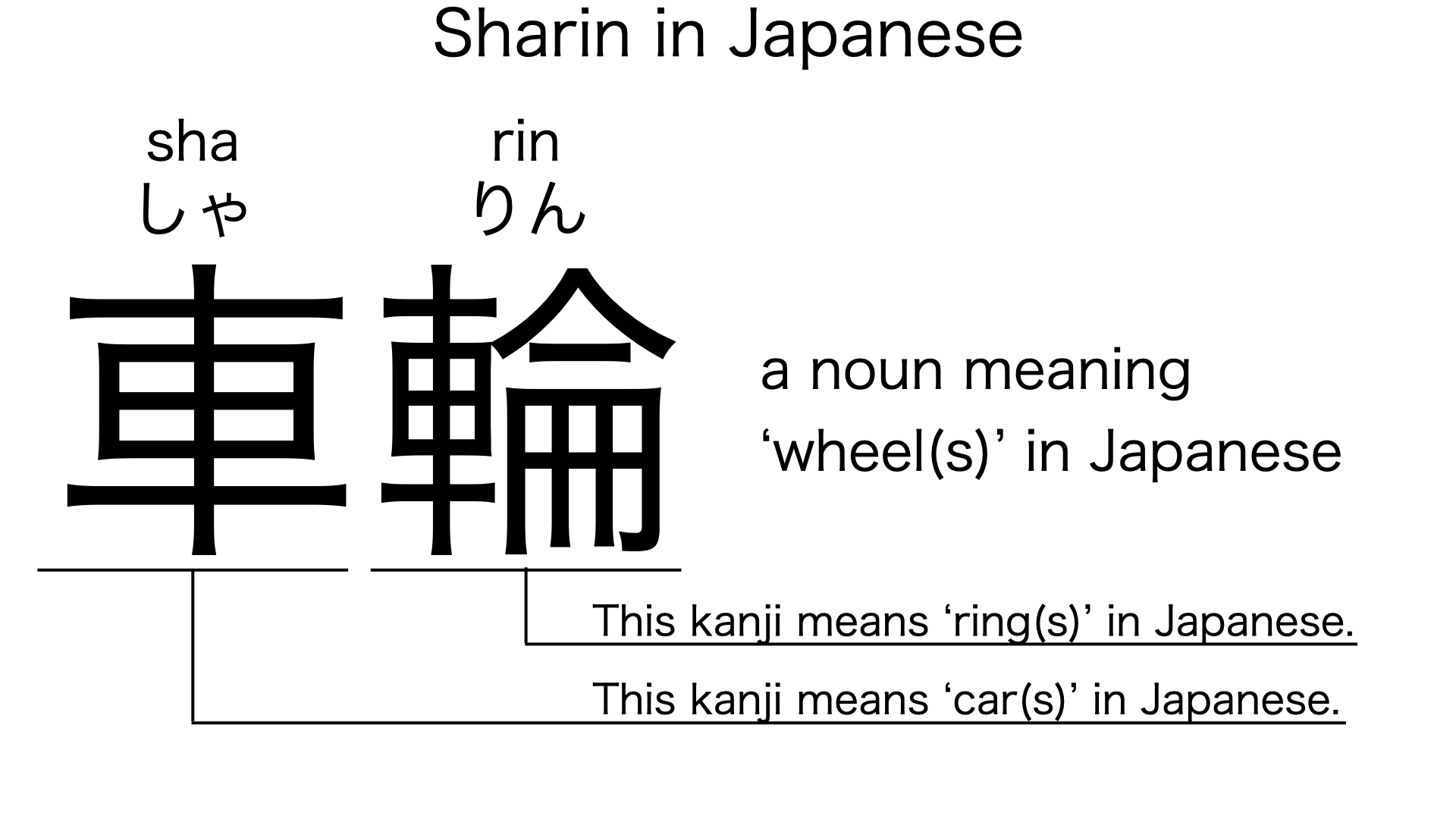What does “sharin” mean in Japanese?
Native speakers say “sharin” to mean ‘wheel’ in Japanese. Perhaps, some Japanese learners know this word as it is sometimes used in Japanese movies, novels, manga, anime, and the like. In this blog post, however, I will explain this word in detail based on its kanji expression. And also, I will explain how to use it through example sentences. My explanations would help Japanese learners understand “sharin” more clearly. Then, let’s get started!
Contents
Definition and meaning of “sharin”
Let me start with the definition and meaning of “sharin”.
- sharin – 車輪 (しゃりん) : a noun meaning ‘wheel’ in Japanese. This can also work as plural. Learn more about Japanese plural.
The definition and meaning are simple and clear. To understand this noun more clearly, however, let me explain its kanji characters in detail, one by one.
What does “sharin” literally mean in Japanese?
The kanji expression of “sharin” consists of the following two kanji characters:
- 車 : a kanji character widely used to mean ‘car’ in Japanese.
- 輪 : a kanji character often used to mean ‘ring’ in Japanese.
From these two kanji characters, we can understand that “sharin” literally means ‘rings for cars’ in Japanese. This literal interpretation is not completely in line with the actual meaning, but still understandable, I think. Wheels can be considered as rings for cars.

When we meet new kanji expressions, we should check their kanji characters in detail to understand their meanings clearly and deeply. In many cases, kanji characters tell us a lot about the meanings of the expressions they form. Actually, here, we could get the better understanding of “sharin” through the detailed kanji check above.
So far, I’ve explained the definition and meaning of “sharin” together with its kanji characters. Then, let me explain how to use it through the example sentences below.
Example #1: how to say “wheel” in Japanese
kanojo ga sharin wo hatsumei shi mashi ta – 彼女が車輪を発明しました (かのじょがしゃりんをはつめいしました)
She invented a wheel.
Below are the new words used in the example sentence.
- kanojo – 彼女 (かのじょ) : a pronoun meaning ‘she’ in Japanese.
- ga – が : a case particle used to make the subject word or the object word in a sentence. In the example, this is used after “kanojo” to make the subject in the sentence.
- wo – を : a case particle used to make the object word in a sentence. In the example, this is used after “sharin” to make the object in the sentence.
- hatsumei shi – 発明し (はつめいし) : one conjugation of the verb, “hatsumei suru”, which means ‘to invent’ in Japanese. In the example, it has been conjugated for the better connection with its following word.
- mashi – まし : one conjugation of the auxiliary verb, “masu”, which is used after a verb to make it polite. In the example, this is used after “hatsumei shi” to make it sound polite.
- ta – た : an auxiliary verb used after a verb, adjective, or auxiliary verb to make its past tense form. In the example, this is used after “hatsumei shi mashi” to make its past tense form, “hatsumei shi mashi ta”.
This is a typical usage of “sharin”. In this example, it works together with the case particle, “wo”, to become the object in the sentence.
Example #2: another usage of “sharin”
sharin wa tsuneni marui – 車輪は常に丸い (しゃりんはつねにまるい)
The wheels are always round.
Below are the new words used in the example sentence.
- wa – は : a binding particle working as a case marker or topic marker. In the example, this works after “sharin” to make the subject in the sentence.
- tsuneni – 常に (つねに) : an adverb meaning ‘always’ in Japanese.
- marui – 丸い (まるい) : an i-adjective meaning ’round’ in Japanese.
This is another typical usage of “sharin”. In this example, it works together with the binding particle, “wa”, to become the subject in the sentence. When we want to mean a ‘wheel’ or ‘wheels’ in Japanese, anyway, this noun is always a very good option.
Summary
In this blog post, I’ve explained the definition and meaning of “sharin” in detail based on its kanji expression. And also, I’ve explained how to use it through the example sentences. Let me summarize them as follows.
- sharin – 車輪 (しゃりん) : a noun meaning ‘wheel’ in Japanese. This can also work as plural. These two kanji characters literally mean ‘rings for cars’ in Japanese. This literal interpretation is not completely in line with the actual meaning, but still understandable, I think. Wheels can be considered as rings for cars.
Hope my explanations are understandable and helpful for Japanese learners.
Leave a Reply